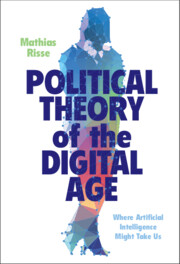Book contents
- Political Theory of the Digital Age
- Political Theory of the Digital Age
- Copyright page
- Dedication
- Contents
- Preface
- Acknowledgments
- 1 Introduction
- 2 Learning from the Amish
- 3 Artificial Intelligence and the Past, Present, and Future of Democracy
- 4 Truth Will Not Set You Free: Is There a Right to It Anyway?
- 5 Knowing and Being Known
- 6 Beyond Porn and Discreditation
- 7 The Fourth Generation of Human Rights: Epistemic Rights in Life 2.0 and Life 3.0
- 8 On Surveillance Capitalism, Instrumentarian Power, and Social Physics
- 9 Data as Social Facts: Distributive Justice Meets Big Data
- 10 God, Golem, and Gadget Worshippers: Meaning of Life in the Digital Age
- 11 Moral Status and Political Membership: Toward a Political Theory for Life 3.0
- Epilogue
- Bibliography
- Index
7 - The Fourth Generation of Human Rights: Epistemic Rights in Life 2.0 and Life 3.0
Published online by Cambridge University Press: 02 February 2023
- Political Theory of the Digital Age
- Political Theory of the Digital Age
- Copyright page
- Dedication
- Contents
- Preface
- Acknowledgments
- 1 Introduction
- 2 Learning from the Amish
- 3 Artificial Intelligence and the Past, Present, and Future of Democracy
- 4 Truth Will Not Set You Free: Is There a Right to It Anyway?
- 5 Knowing and Being Known
- 6 Beyond Porn and Discreditation
- 7 The Fourth Generation of Human Rights: Epistemic Rights in Life 2.0 and Life 3.0
- 8 On Surveillance Capitalism, Instrumentarian Power, and Social Physics
- 9 Data as Social Facts: Distributive Justice Meets Big Data
- 10 God, Golem, and Gadget Worshippers: Meaning of Life in the Digital Age
- 11 Moral Status and Political Membership: Toward a Political Theory for Life 3.0
- Epilogue
- Bibliography
- Index
Summary
British writer H. G. Wells was a major advocate for a universal declaration of human rights of the kind later passed in 1948. Wells paid much attention to the importance of knowledge for his era, more than found its way into the actual declaration. At this stage, an enhanced set of epistemic rights that strengthen existing human rights – as part of a fourth generation of human rights – is needed to protect epistemic actorhood in those four roles introduced in Chapter 5. Epistemic rights are already exceedingly important because of the epistemic intrusiveness of digital lifeworlds in Life 2.0, and they should also include a suitably defined right to be forgotten (that is, a right to have certain information removed from easy accessibility through internet searches). If Life 3.0 does emerge, we might also need a right altogether different from what is currently acknowledged as human rights, the right to exercise human intelligence to begin with. The required argument for the validity of the right to the exercise of human intelligence can draw on the secular meaning-of-life literature. I paint with a broad brush when it comes to the detailed content of proposed rights, offering them manifesto-style.
Keywords
- Type
- Chapter
- Information
- Political Theory of the Digital AgeWhere Artificial Intelligence Might Take Us, pp. 137 - 159Publisher: Cambridge University PressPrint publication year: 2023

